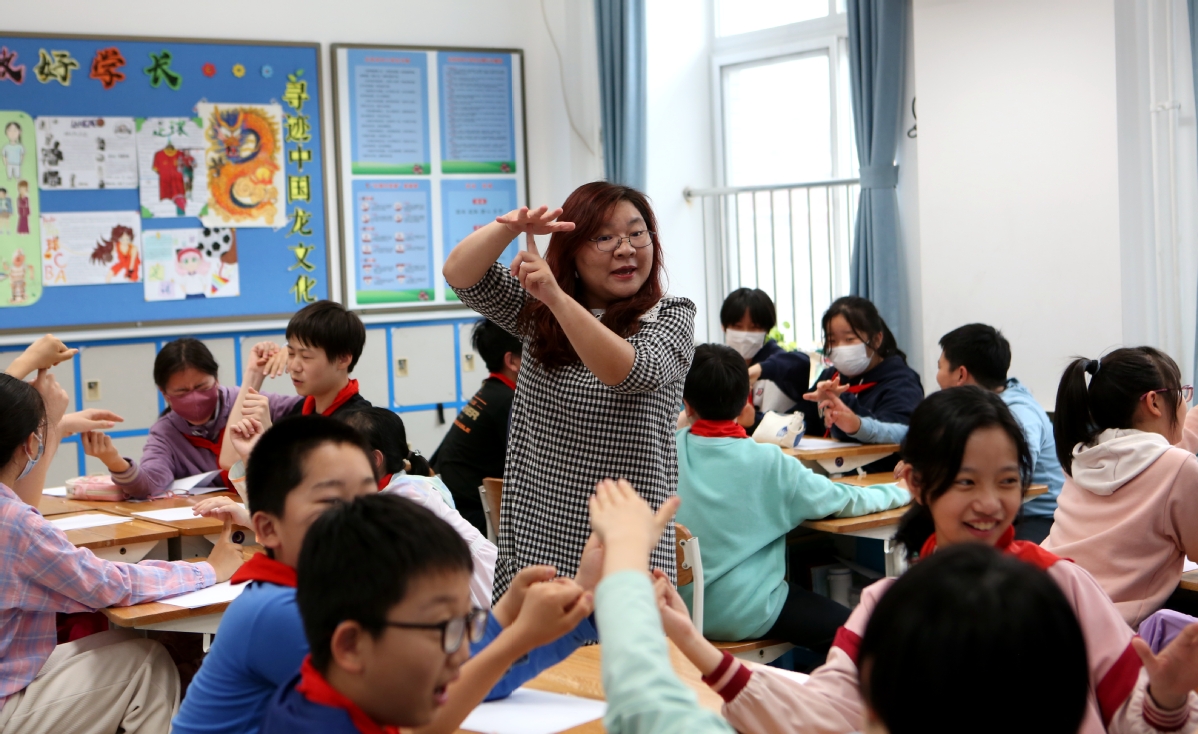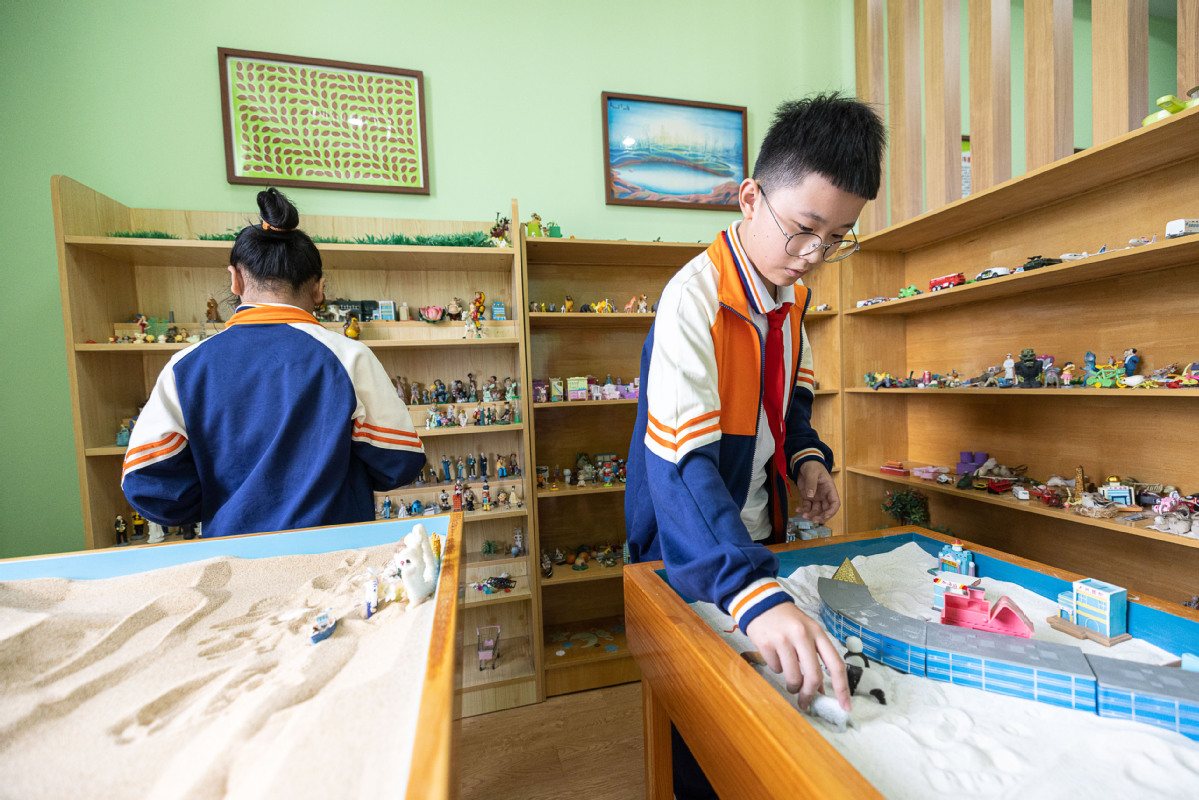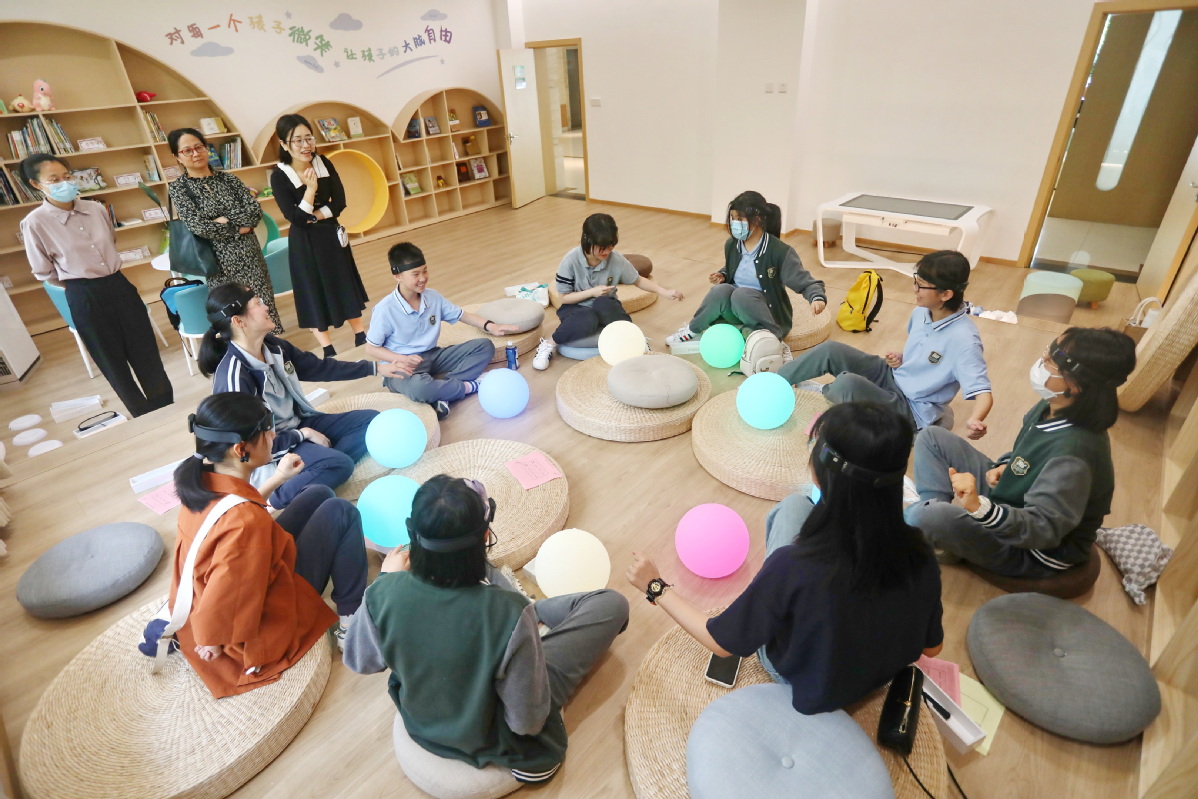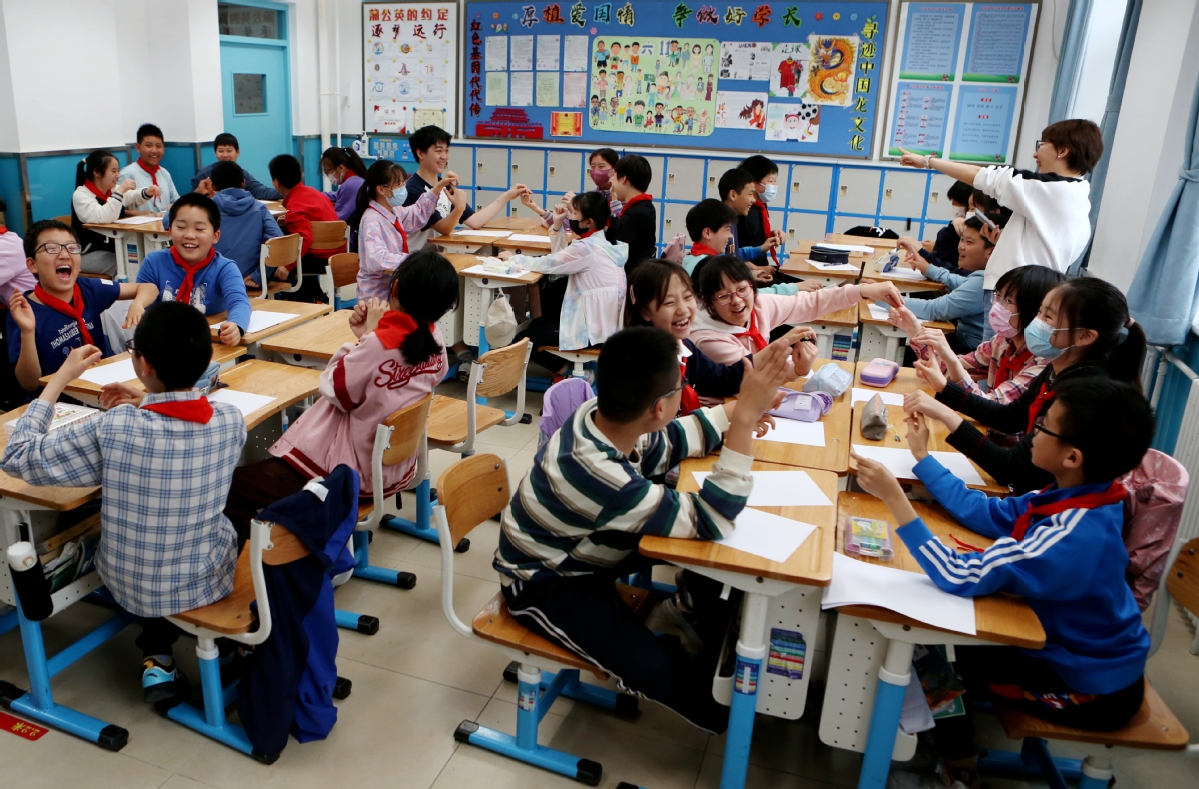
Zhang Haimei has been struggling with her son's severe depression for nearly three years. He was absent from school for a year and was striving to return to normalcy when he faced the high school entrance exam in June.
She wore an auspicious red qipao to bring him good luck in the test. However, on the afternoon of the second day of the exam, he returned home and uttered the words she dreaded. "I won't do the exam," he told his mother.
It was not until after nine in the evening that his mood calmed down, and he agreed to do the exam the next day.
At the beginning of her son's illness, Zhang thought he had just encountered "a small setback" in the second year of middle school, but it turned into a major obstacle for him.
READ MORE: Sister cities join hands across the water
Math was her son's academic weakness, and the number of times he flunked the subject began to increase. When Zhang tried to talk to him about his grades, he would sometimes "suddenly explode," shout, throw things, and even lash out at his parents.
He gradually became addicted to video games and ignored his parents' attempts to break the negative spiral. In the second half of his second year in middle school, he opened a window in front of his parents and threatened to take his own life.
Zhang decided that he needed counseling for his depression.

Emotional crisis
Deng Xiaomei is a national Grade II psychological consultant and an expert who works with the Guangzhou Youth Cultural Palace's 12355-volunteer helpline for teenagers.
When the emotional pressure on a child exceeds certain levels, he or she exhibits telltale signs, Deng told ThePaper.cn news outlet. These signs include being irritable, overdependent, continuously sad, anxious, or inattentive, avoiding social activities, increased internet usage, and significant changes in sleeping and eating habits.
"The general emotional crisis reaction will last six to eight weeks. When children exhibit more than one or two of these conditions, it is recommended to seek help from a school psychologist or professional organizations," she said.
Looking back, Zhang said that as a parent she had downplayed many of the signs of mental illness in her son.
She tried to impose too many of her own ways and ideas on the child, which was counterproductive to addressing his psychological problems. On one occasion she told him to attend a concert to relieve his depression, although he was reluctant to go.
After arriving at the concert hall, her son said again that he did not feel good about going, but Zhang insisted he attend. After half an hour, he became very agitated and eventually acted aggressively.
READ MORE: From historic sites to high-tech hubs
During that period he resisted most social interaction and lost interest in almost everything, Zhang said.
Li Yanjuan, a clinical psychologist at Peking University, explained that depression is a mood disorder that causes loss of interest and a persistent feeling of sadness.
"Chinese people may be relatively restrained and reserved, and they are somewhat discouraged from expressing emotions, especially negative emotions," said Li. "They tend to be influenced by their social environment, and they may not be willing or able to find appropriate ways to express these feelings."
"Some of my teenage patients think that their classmates won't like them if they admitted that they were depressed or that people would feel bad and wouldn't want to play with them, so they tend to hide their depression," said Li.
Zhang's son was reluctant to say he was depressed. Instead, he said he felt sick, but resisted his mother's advice to take medicine or see a doctor.
She now encourages him not to suppress his emotions all the time, hoping that he can "cry and laugh whenever he wants" and "not bury everything in his heart".

Lowering defenses
Like Zhang's son, Pang Haolin, a 22-year-old college student, had to take temporary breaks from studying during secondary and high school due to mental health problems. He used to experience severe anxiety and discomfort when he was under too much pressure at school or from his parents.
He has gotten better, but both he and his parents were "pretty defensive" about his mental state for a long time.
Pang was unable to express himself as openly as he does now, especially with his father, and resisted the idea to be open. He said his concerns and emotions were met with "endless criticism" from his dad.
"If your child is already tired of learning and overly anxious in school, parents must support and understand the child's ideas instead of blindly giving them mandatory requirements," Pang said.
"I think the most important thing for children is that they have time to figure out things for themselves, think about what they want to do in the future, and find a purpose and direction in life."
Li, the psychologist, said cognitive rigidity, like the idea that life has no value and meaning if we fail a certain test or task, is an important factor in depression.
READ MORE: Youngsters take Budapest by storm
Similar to Zhang's son, and Pang when he was younger, having no hope for the future and not maintaining a positive attitude toward the world is a typical sign of depression, she said. It is important to give teenagers such as some time and space to find the future they really want, she added.
Academic pressure
Li Nian, a junior majoring in Social Work at the University of Science and Technology in Beijing, was one of those teenagers who experienced severe depression, confusion, and stress during her high school years.
As a high achiever, Li used to be in the top five of her class and excelled at schoolwork. But this did not offer her enough joy or any sense of achievement. Instead, she became increasingly weary of school, and was stressed out by countless exams. She would motivate herself to work harder for her future, but the perceived setbacks seemed harsher and increasingly unbearable.
With high academic expectations imposed by herself, the school, and her family, Li felt "pressure rushing toward her like tidal waves".
For a period during her high school years, Li cried every day. She described feeling like her chest was being constricted by a gust of air that she couldn't breathe out. At her worst, she sat stiffly in her bed for nearly an hour.
Li initially sought help from her parents but received no sympathy and was admonished. "You are not depressed," Li recalled was her parents' initial reaction. "You are not like the depressed girl we saw on a TV drama," they told her.
It was only when she texted her father from school telling him she had suicidal thoughts that her parents took her to the hospital. Li was diagnosed with moderate depression and began receiving professional treatment including counseling, and later medication.
Her depression, though still recurrent, has been significantly ameliorated compared with the most difficult times back in high school. However, her situation and history of adolescent depression are shared by many young people.

Age old problem
The number of depression cases increases as children progress through school, according to research on the annual evolution of adolescent mental health status from 2009 to 2020 contained in the 2020 Blue Book of Mental Health in China. The blue book is co-sponsored by the Institute of Psychology, the Chinese Academy of Sciences, and the Social Sciences Academic Press.
The detection rate of depression in elementary school is about 10 percent, with major depression between 1.9 percent to 3.3 percent, whereas the detection rate of depression in high school is close to 40 percent, with major depression at 10.9 to 12.5 percent, according to the blue book.
The average level of depression among teenagers from the third year of middle school to higher grades is significantly higher than those in the lower grades. As ages and academic stages rise, depression among adolescents becomes more serious and pressing.
The average age for students in China to be excused from school for the first time due to mental difficulties is less than 14 years, according to the latest publication of the National Mental Health Assessment Development Center of the CAS's Institute of Psychology and other bodies.
Of those, more than 30 percent are exposed to other physical and psychological difficulties, such as sleep deprivation and obsessive-compulsive disorder. When teenagers are diagnosed with mental illnesses, half of them take one to four years to recover.
READ MORE: Dance and dribble to new bonds
Li Nian believes that society still lacks qualified and responsible mental health counselors, especially at each educational level. This shortfall prevents families from getting help from school counselors and puts the financial burden on them to pay for treatment.
She also thinks that the social stigma attached to psychological difficulties makes it harder for depressed teenagers to recover. More general education regarding symptoms of psychological illnesses, as well as better medical definitions of psychological illnesses, can foster empathy and reduce stigma, she added.
Pang's mother, Guo Peiyi, believes that the school's teachers and her change of attitude toward her son played a crucial role in supporting and helping him when he was at his lowest point.
"At that time, several teachers and I told Pang that it didn't matter how he did in the exam; as long as he could finish it, it was already a success," said Guo.

Riding it out
As parents who have accompanied their children through depression, Guo and Zhang have both seen families and society now pay more attention to this trend and generally have a better attitude toward mental health issues.
They believe that with the rise of depression in adolescents and the increasing pressure from academic competition, schools and parents are more open-minded and understanding of the importance and seriousness of these problems than they were in the past.
Wang Pan, deputy director of the Beijing Municipal Commission of Education, said at a ceremony in May to promote awareness about students' mental health, that the commission has always attached great importance to students' mental health.
READ MORE: China to prioritize employment policy reforms to support modernization
He stressed the need to understand the importance of working on students' mental health issues, improving services for those affected, and cultivating students' positive thinking.
Li, the psychologist, advised young people undergoing mental hardships to not blame anyone, including themselves, their parents, or society, for their problems.
A 20-minute walk to the park can be a positive sign of engagement and acceptance of real life, she said. Sometimes feeling down is inevitable, and almost everyone is anxious and stressed nowadays, so what we need to learn is how to deal with it, Li said.
"When the wave comes, we don't have to push it down. We can actually surf with skills that a lot of psychologists are now working on by testing different interventions, and that's what my field is doing," said the psychologist.
"Of course, mental health education in our country started late, and clinical psychologists still have a relatively small voice, but we are trying as much as we can."


